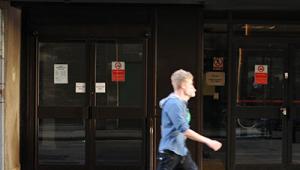This was down 0.4 percentage points from the 7.2% recorded over the three months to December and down from 7.8% at the same point last year, the Office for National Statistics revealed.
Employment continues to increase, and there were 30.43 million people in work over the three months to March, 283,000 more than in the preceding three-month period and 722,000 more than a year earlier.
‘These increases in employment are partly due to more self-employed people,’ the ONS said.
The Department for Work and Pensions said the employment figures showed the largest quarterly rise since records began, while the unemployment rate had hit a five-year low.
Youth unemployment, at 19%, was much higher than the headline rate of 6.8%. However, this was down one percentage point from the three months to December and the DWP said the number of 16- to 24-year-olds out of work was at its lowest level since 2008.
‘As the recovery takes hold, more people are able to get a job or set up their own business and become the employers of tomorrow,’ employment minister Esther McVey said. ‘Each and every person who has made a new start or hired someone new is helping to make Britain a more prosperous and confident place to be.
‘We will continue to support those in and out of work who want to get on and fulfil their ambitions for a more secure future.’
But trade unions said the rise in self-employment was creating a more vulnerable workforce.
Unite general secretary Len McCluskey said: ‘Many people are being forced to take up ‘self-employment’ as the permanent, full-time jobs they are qualified to do are simply not there.
‘The big concern regarding self-employment is that it is precarious and provides an irregular income. It also forces people out of social provisions enjoyed by those in permanent jobs, such as pensions and paid holidays. People become more vulnerable and worse off.’
Ian Brinkley, director of the Work Foundation, also commented on the marked rise in self- and part-time employment.
'These permanent jobs are not necessarily secure – zero hour contracts are more likely to be for permanent than temporary posts and we have no reliable way of knowing what their contribution to overall employment growth has been in the last quarter,' he said.
'The overall good news may not therefore have much impact on perceptions of job insecurity.'





















